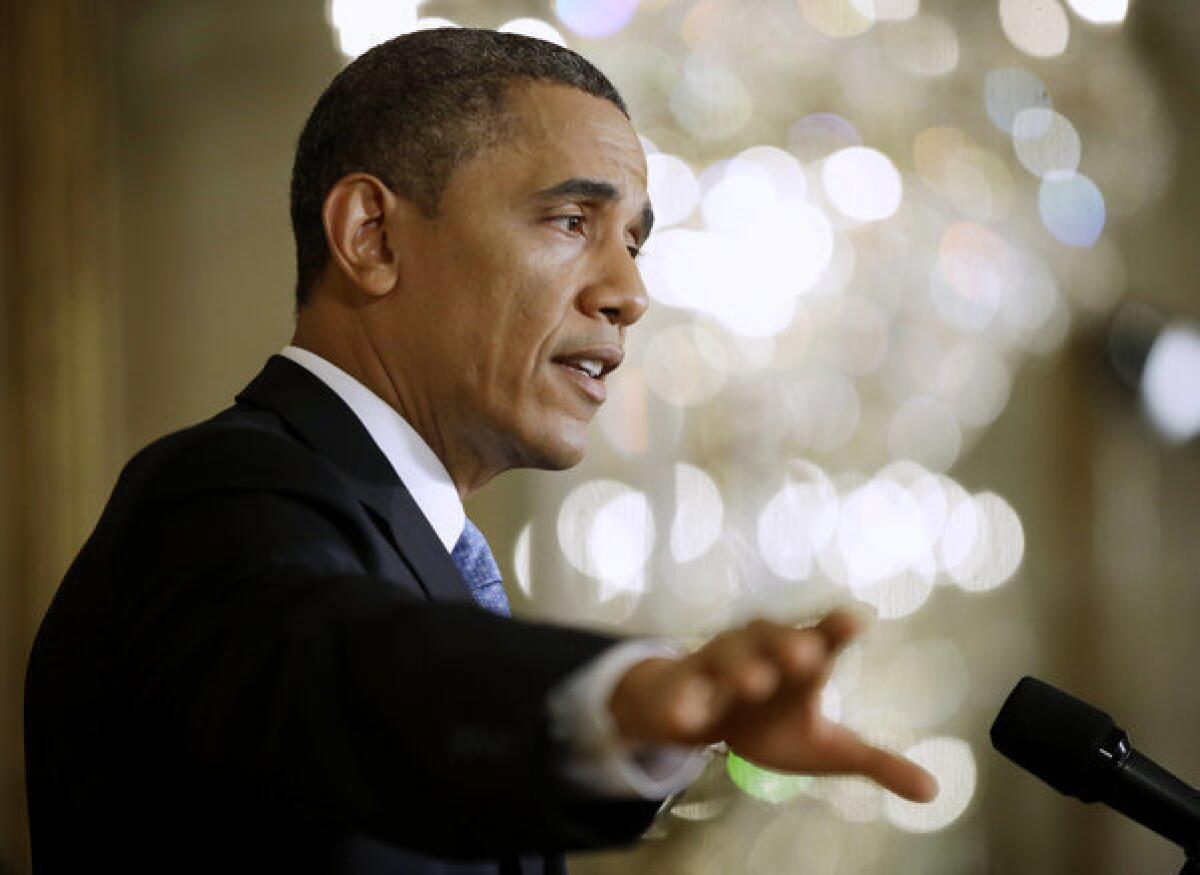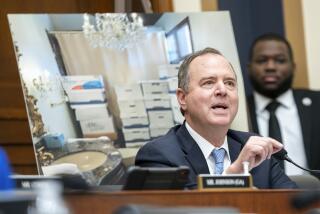McManus: For Democrats, unity and its pitfalls

It’s hard to recognize the Democratic Party these days. In recent decades, it’s been a divided, brawling tribe. But this year, Democrats are one big, happy family.
Sure, there was grumbling from the left over President Obama’s agreement to keep tax cuts in place for couples making between $250,000 and $450,000 a year. But that quickly gave way to satisfaction that Obama had won the “fiscal cliff” fight, and growing confidence that he can win the next round over the federal debt ceiling as well.
Two factors have given Democrats this unusual sense of unity and well-being: the surprisingly big margin by which Obama won November’s presidential election, and the obduracy of House Republicans in refusing to notice that their arguments lost. If the GOP wants to keep alienating voters by telling them they’re wrong, the Democrats are happy to offer them more opportunities.
In recent weeks, the president has dared Republicans to refuse to raise the federal government’s debt ceiling. He has made clear that he will push for significant immigration reform and gun control measures, issues on which Democrats believe the GOP is out of step with mainstream opinion.
“The dominant sense among Democrats is that the party is on a roll,” said William A. Galston, a former Bill Clinton aide now at the Brookings Institution. “And why not? 2012 was a victory, after all.”
But there’s a cloud on the Democrats’ blue horizon: the unsolved problems of federal spending and the national debt.
As Obama has acknowledged, if federal spending continues to grow unabated — especially on the big entitlement programs of Medicare, Medicaid and Social Security — there won’t be enough money in the Treasury to pay for much else. The modest increases in tax revenue he just obtained won’t be significant over the long run.
Even if the president wins the coming fight over the debt ceiling, there’s no escape from the spending problem. By the end of February, Congress must either undo the automatic sequester of federal funding that it ordained in earlier bouts of budget wrestling or see savage cuts to domestic and defense programs. And by the end of March, the government needs a new spending bill to allow agencies to keep operating.
That’s when the Republicans’ best chance to press for spending cuts will come. And that’s when Democrats could revert to their traditional feuding ways — because, as even Obama agrees, the biggest target for reductions is one of the Democrats’ favorite programs: Medicare.
“I agree with Democrats and Republicans that the aging population and the rising cost of healthcare [make] Medicare the biggest contributor to our deficit,” Obama said during the fiscal cliff negotiations. “I believe we’ve got to find ways to reform that program without hurting seniors who count on it to survive.”
Medicare already accounts for about 15% of federal spending (not counting interest), and the Congressional Budget Office projects that the cost will nearly double in 10 years if no changes are made. Bringing federal spending under control without touching Medicare simply isn’t practical.
But it’s a prospect that chills many Democrats because defending Medicare and Social Security benefits is the clearest unifying doctrine their party has, just as resisting tax increases is for Republicans.
So though Obama may agree in theory about the need for cuts, deciding what to cut is certain to be divisive.On the party’s left, many progressives hate the idea of touching Medicare at all. In 2011, after Obama flirted with accepting an increase in the Medicare eligibility age from 65 to 67 in talks with House Speaker John A. Boehner (R-Ohio), labor unions and other progressive groups quickly organized campaigns to denounce the idea.
In the party’s center, pro-business New Democrats worry that without major changes in Medicare, the federal deficit will balloon and the economy will suffer. But they didn’t hear much encouragement from Obama this week.
At his news conference Monday, instead of calling for far-reaching reforms, Obama said merely, “I’m open to making modest adjustments to programs like Medicare.”
And instead of proposing steps toward bipartisan consensus on the issue — the only way to fix Medicare because without it any changes will simply become fodder for election campaign attacks by both sides — Obama took a brass-knuckled swipe at GOP conservatives.
“They are suspicious about government’s commitments … to make sure that seniors have decent healthcare,” the president said. “They have suspicions about Social Security.”
Attacks like that may be great for party unity in the short run. But they’re a distraction from what Obama and his allies should be doing: building support among their own voters for real reform in Medicare, and then working to bring pragmatic Republicans along.
Otherwise, the now-victorious Democrats risk finding themselves, four years from now, in much the same place Republicans are today: so absorbed in maintaining their own unity that they’ve lost voters’ confidence in their ability to govern.
Follow Doyle McManus on Twitter @DoyleMcManus
More to Read
A cure for the common opinion
Get thought-provoking perspectives with our weekly newsletter.
You may occasionally receive promotional content from the Los Angeles Times.






